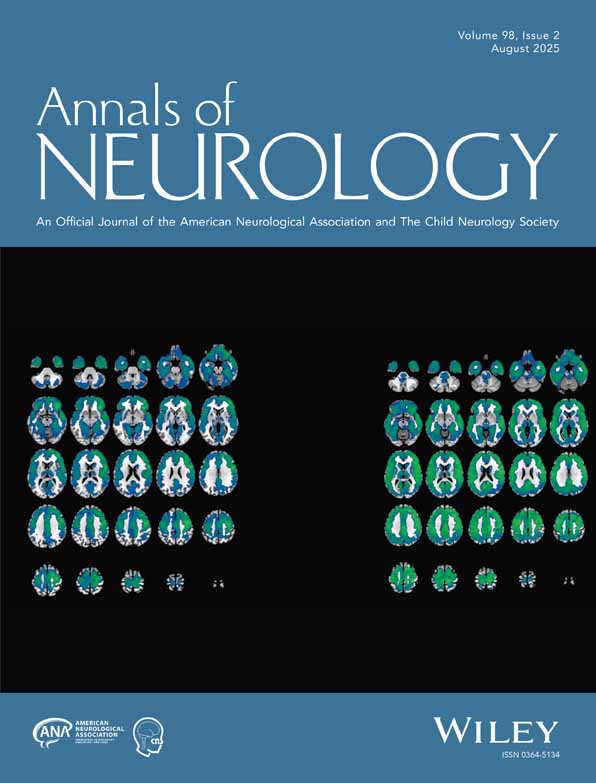Utility of anti-Hu antibodies in the diagnosis of paraneoplastic sensory neuropathy
Jose Luis Molinuevo MD
Service of Neurology, Institut d'Investigació Biomèdica August Pi i Sunyer (IDIBAPS), Hospital Clínic, Universitat de Barcelona, Barcelona
Search for more papers by this authorCorresponding Author
Francesc Graus MD
Service of Neurology, Institut d'Investigació Biomèdica August Pi i Sunyer (IDIBAPS), Hospital Clínic, Universitat de Barcelona, Barcelona
Service of Neurology, Hospital Clínic, Villarroel 170, Barcelona 08036, SpainSearch for more papers by this authorCarmen Serrano MD
Service of Neurology, Hospital de Sant Pau, Universitat Autònoma de Barcelona, Barcelona;Spain
Search for more papers by this authorRamón Reñe MD
Service of Neurology, CSU Bellvitge, Universitat de Barcelona, Barcelona
Search for more papers by this authorAntonio Guerrero MD
Service of Neurology, Hospital Universitario San Carlos, Madrid, Spain
Search for more papers by this authorIsabel Illa MD
Service of Neurology, Hospital de Sant Pau, Universitat Autònoma de Barcelona, Barcelona;Spain
Search for more papers by this authorJose Luis Molinuevo MD
Service of Neurology, Institut d'Investigació Biomèdica August Pi i Sunyer (IDIBAPS), Hospital Clínic, Universitat de Barcelona, Barcelona
Search for more papers by this authorCorresponding Author
Francesc Graus MD
Service of Neurology, Institut d'Investigació Biomèdica August Pi i Sunyer (IDIBAPS), Hospital Clínic, Universitat de Barcelona, Barcelona
Service of Neurology, Hospital Clínic, Villarroel 170, Barcelona 08036, SpainSearch for more papers by this authorCarmen Serrano MD
Service of Neurology, Hospital de Sant Pau, Universitat Autònoma de Barcelona, Barcelona;Spain
Search for more papers by this authorRamón Reñe MD
Service of Neurology, CSU Bellvitge, Universitat de Barcelona, Barcelona
Search for more papers by this authorAntonio Guerrero MD
Service of Neurology, Hospital Universitario San Carlos, Madrid, Spain
Search for more papers by this authorIsabel Illa MD
Service of Neurology, Hospital de Sant Pau, Universitat Autònoma de Barcelona, Barcelona;Spain
Search for more papers by this authorAbstract
Anti-Hu antibodies (Hu-Abs) were positive in 40 patients with paraneoplastic sensory neuropathy (PSN) and in 1 patient with idiopathic sensory neuropathy in a series of 126 patients who presented with clinical features suggestive of PSN. The specificity of Hu-Abs was 99% and the sensitivity was 82%. Nine (18%) PSN patients were Hu-Ab–negative, and their sera did not harbor other specific anti-neuronal of anti-ganglioside antibodies. Small cell lung carcinoma (SCLC) was the leading neoplasm in the Hu-Ab–positive (79%) and Hu-Ab–negative (44%) groups. This study confirms the value of Hu-Abs for the diagnosis of PSN and SCLC and also emphasizes that in patients with possible PSN, the absence of Hu-Abs does not exclude cancer, particularly in those patients with risk factors for SCLC.
References
- 1 Dalmau J, Graus F, Rosenblum MK, Posner JB. Anti-Hu-associated paraneoplastic encephalomyelitis/sensory neuronopathy. A clinical study of 71 patients. Medicine 1992; 71: 59–72
- 2 Lucchinetti CF, Kimmel DW, Lennon VA. Paraneoplastic and oncologic profiles of patients seropositive for type 1 antineuronal nuclear autoantibodies Neurology 1998; 50: 652–657
- 3 Dropcho EJ. Anti-amphiphysin antibodies with small cell lung carcinoma and paraneoplastic encephalomyelitis. Ann Neurol 1996; 39: 659–667
- 4 Honnorat J, Antoine JCH, Derrington E, et al. Antibodies to a subpopulation of glial cells and a 66 kDa developmental protein in patients with paraneoplastic neurological syndromes J Neurol Neurosurg Psychiatry 1996; 61: 270–278
- 5 O'Neill JH, Murray NMF, Newson-Davis J. The Lambert Eaton myasthenic syndrome. A review of 50 cases. Brain 1988; 111: 577–596
- 6 Windebank AJ, Blexrud MD, Dyck PJ, Karnes JL. The syndrome of acute sensory neuropathy: clinical features and electrophysiological and pathological changes. Neurology 1990; 40: 584–591
- 7 Kaufman MD, Hopkins LC, Hurwitz BJ. Progressive sensory neuropathy in patients without carcinoma: a disorder with distinctive clinical and electrophysiological findings. Ann Neurol 1981; 9: 237–242
- 8 Dawson DM, Samuels MA, Morris J. Sensory form of acute polyneuritis Neurology 1988; 38: 1728–1731
- 9 Oh SJ, Joy JL, Kuruoglu R. “Chronic sensory demyelinating meuropathy”: chronic inflammatory demyelinating polyneuropathy presenting as a pure sensory neuropathy. J Neurol Nerosurg Psychiatry 1992; 55: 677–680
- 10 Griffin JW, Cornblath DR, Alexander E, et al. Ataxic sensory neuropathy and dorsal root ganglionitis associated with Sjögren's syndrome. Ann Neurol 1990; 27: 304–315
- 11 Graus F, Elkon KB, Cordon Cardo C, Posner JB. Sensory neuronopathy and small cell lung cancer: antineuronal antibody that also reacts with the tumor. Am J Med 1986; 80: 45–52
- 12 Graus F, Dalmau J, Reñé R, et al. Anti-Hu antibodies in patients with small-cell lung cancer: association with complete response to therapy and improved survival. J Clin Oncol 1997; 15: 2866–2872
- 13 Saiz A, Arpa J, Sagasta A, et al. Autoantibodies to glutamic acid decarboxylase in three patients with cerebellar ataxia, late-onset insulin-dependent diabetes mellitus, and polyendocrine autoimmunity. Neurology 1997; 49: 1026–1030
- 14 Illa I, Ortiz N, Gallardo E, et al. Acute axonal Guillain-Barre syndrome with IgG antibodies against motor axons following parenteral gangliosides. Ann Neurol 1995; 38: 218–224
- 15 Chalk CH, Lennon VA, Stevens JC, Windebank AJ. Seronegativity for type 1 antineuronal nuclear antibodies (anti-Hu) in subacute sensory neuropathy patients without cancer. Neurology 1993; 43: 2209–2211
- 16 Moll JWB, Markusse HM, Pijnenburg JJJM, et al. Antineuronal antibodies in patients with neurologic complications of primary Sjögren's syndrome. Neurology 1993; 43: 2574–2581
- 17 Sillevis-Smitt P, Manley G, Moll J, et al. Pitfalls in the diagnosis of autoantibodies associated with paraneoplastic neurologic disease. Neurology 1996; 46: 1739–1741
- 18 Alamowitch S, Graus F, Uchuya M, et al. Limbic encephalitis and small cell lung cancer. Clinical and immunological features. Brain 1997; 120: 923–928
- 19 Mason WP, Graus F, Lang B, et al. Small-cell lung cancer, paraneoplastic cerebellar degeneration and the Lambert-Eaton myasthenic syndrome. Brain 1997; 120: 1279–1300
- 20 Iwahashi T, Inoue A, Koh ChS, Yanagisawa N. A study on a new antineuronal antibody in a case of paraneoplastic sensory neuropathy associated with breast carcinoma. J Neurol Neurosurg Psychiatry 1997; 63: 516–519
- 21 Saiz H, Dalman J, Butler MH, et al. Anti-amphyiphysin I antibodies in patients with paraneoplastic neurologic disorders associated with small-cell lung carcinoma. J Neurol Neurosurg Psychiatry (In press)




